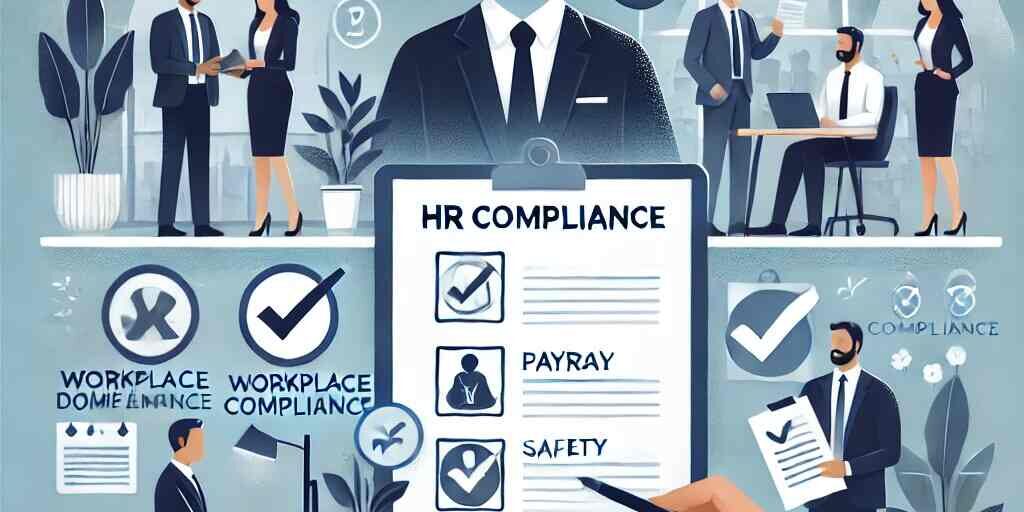As companies grow, their workforce often expands rapidly, making human resource compliance increasingly complex. From labor laws to employee benefits, HR compliance ensures businesses meet legal requirements while maintaining employee trust and satisfaction. For small and medium-sized businesses scaling up, understanding and implementing effective HR compliance practices is essential to avoid costly penalties and create a thriving workplace.
The Basics of HR Compliance
What Is HR Compliance?
HR compliance refers to the process of adhering to laws and regulations that govern workplace practices. These may include federal, state, and local labor laws related to hiring, wages, benefits, workplace safety, and more. For growing companies, staying compliant ensures operational stability and avoids legal pitfalls.
Why It Matters for Growing Businesses
- Risk Mitigation: Non-compliance can lead to penalties, fines, or lawsuits, which can derail growth efforts.
- Improved Employee Trust: Compliance fosters transparency and fairness, boosting employee satisfaction.
- Reputation Management: A compliant workplace builds credibility with stakeholders, clients, and job candidates.

Key Compliance Areas for Small and Growing Businesses
- Payroll Compliance
- Ensure employees are paid correctly and on time.
- Adhere to federal and state minimum wage laws, overtime regulations, and tax reporting requirements.
- Hiring Practices
- Follow Equal Employment Opportunity (EEO) laws to prevent discrimination.
- Ensure that job postings, interviews, and hiring decisions are free from bias.
- Employee Classification
- Differentiate between full-time employees, part-time employees, and independent contractors.
- Misclassification can result in tax issues, benefit disputes, and labor law violations.
- Workplace Safety Regulations
- Implement Occupational Safety and Health Administration (OSHA) standards to protect workers from hazards.
- Create training programs and enforce policies for a safe and secure work environment.
- Leave Policies and Benefits
-
- Comply with the Family and Medical Leave Act (FMLA) to provide eligible employees with unpaid leave for medical or family reasons.
- Address state-specific laws regarding paid sick leave and parental leave.
Common HR Compliance Pitfalls to Avoid
- Incomplete Employee Documentation
- Maintain accurate records for employee onboarding, including I-9 verification forms, tax forms, and contracts.
- Regularly update files to reflect changes in roles, benefits, or legal requirements.
- Failure to Stay Updated on Labor Laws
- Labor laws often change, particularly at the state level.
- Subscribe to newsletters from agencies like the U.S. Department of Labor (DOL) or consult legal experts to stay informed.
- Ignoring Internal Audits
- Periodically review payroll processes, benefits administration, and employee classifications.
- Correct discrepancies before they lead to legal challenges.
- Overlooking State and Local Regulations
-
- While federal laws provide a baseline, state and local rules often add extra layers of complexity.
- For example, California requires meal and rest breaks that may not apply in other states.
Practical HR Compliance Tips for Growing Companies
- Invest in HR Training
- Provide ongoing training for HR staff and managers on compliance topics like harassment prevention, workplace safety, and documentation practices.
- Workshops and webinars can keep your team up to speed on regulatory changes.
- Leverage HR Technology
- Use software to automate compliance tasks, such as tracking employee work hours, benefits enrollment, and payroll.
- Platforms like BambooHR or Gusto can simplify this for small businesses.
- Create a Compliance Checklist
- Develop a detailed checklist tailored to your business’s industry and size.
- Include tasks such as verifying new hire documents, updating workplace policies, and scheduling safety training sessions.
- Consult HR Experts
- Partner with firms like SW HR Consulting to identify compliance gaps and develop customized solutions.
- External experts can also assist in conducting audits and drafting updated policies.
- Review Policies Regularly
-
- Conduct an annual review of workplace policies to ensure alignment with new labor laws.
- Engage employees in the process by seeking feedback on policies related to benefits, workplace safety, and leave.
→ Learn more about Building Inclusive Workplaces: DEI Strategies for US Businesses
The Role of HR in Ensuring Compliance
Proactive HR Strategies
- HR teams should integrate compliance into everyday operations, from recruitment to payroll.
- A proactive approach involves anticipating regulatory changes and preparing policies in advance.
Communicating Obligations
- Regularly educate employees and managers about their roles in compliance, from maintaining safety standards to respecting workplace diversity policies.
Building a Compliance-First Culture
- Foster accountability by encouraging employees to report compliance issues without fear of retaliation.
- Celebrate milestones, such as passing a compliance audit or meeting safety training goals, to reinforce positive behaviors.

Case Studies and Real-Life Examples
- Compliance Missteps and Lessons Learned
- A small company fined for misclassifying contractors learned to implement stricter onboarding processes.
- An example of a business fined for failing to provide OSHA-mandated safety training.
- Success Stories in HR Compliance
-
- A rapidly growing tech startup used compliance software to streamline payroll and benefits, avoiding fines during expansion.
- A retail company’s HR department conducted regular audits, ensuring smooth scaling operations and increased employee satisfaction.
Bottom Line
A comprehensive onboarding process, encompassing these steps, is instrumental in cultivating a productive and satisfying work environment for new hires. From initial preparation to the six-month check-in, each phase plays a critical role in ensuring the new employee’s successful integration into the company. By meticulously adhering to this checklist, organizations not only enhance employee retention and productivity but also establish a robust foundation for long-term success and a positive workplace culture.
SW HR Consulting has been helping companies to build their teams and values for over 10 years. Contact us to find out more about our unique HR Outsourcing services and see how our expertise can benefit you.







